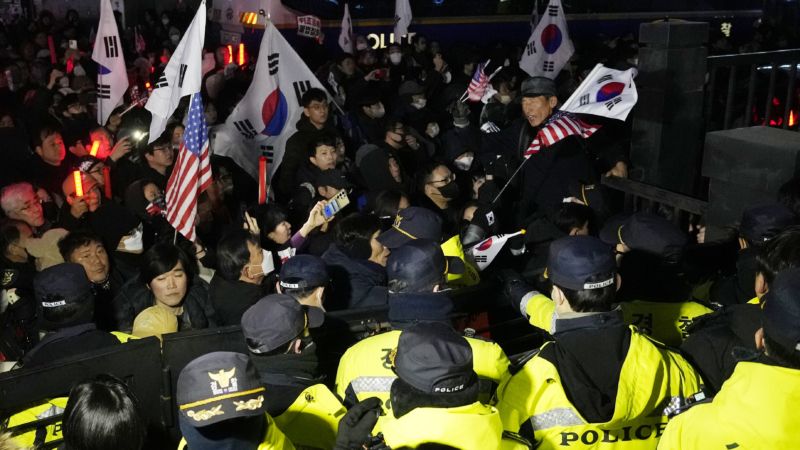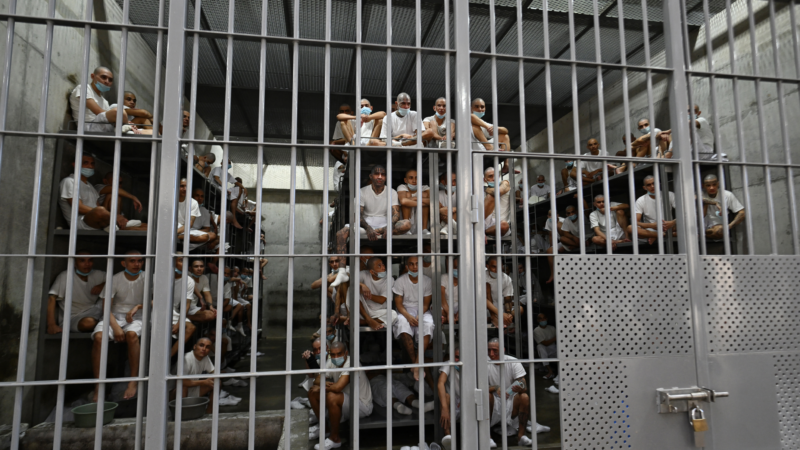South Korean court orders formal arrest of President Yoon over martial law decree
SEOUL, South Korea — South Korea’s impeached president, Yoon Suk Yeol, was formally arrested early Sunday, days after being apprehended at his presidential compound in Seoul. He faces possible imprisonment over his ill-fated declaration of martial law last month.
Yoon’s arrest could mark the beginning of an extended period in custody for him, lasting months or more.
The decision to arrest Yoon triggered unrest at the Seoul Western District Court, where dozens of his supporters destroyed the court’s main door and windows. They used plastic chairs and police shields that they managed to wrestle away from officers. Some got inside a hallway and were seen throwing objects and using fire extinguishers.
Hundreds of police officers were deployed to suppress the riot at the court. Dozens of people were arrested on-site, while some injured police officers were seen being treated at ambulance vans. It wasn’t immediately clear whether any court staff were injured.
Following an hourlong deliberation, the court granted law enforcement’s request for an arrest warrant on Yoon, seeing him as a threat to destroy evidence. Yoon and his lawyers on Saturday appeared before the court’s judge during a hearing and argued for his release.
Yoon, who has been in detention since he was apprehended Wednesday in a massive law enforcement operation at his residential compound, faces potential rebellion charges linked to his declaration of martial law on Dec. 3, which set off the country’s most serious political crisis since its democratization in the late 1980s.
The Corruption Investigation Office for High-Ranking Officials, which is leading a joint investigation with police and the military, can now extend Yoon’s detention to 20 days, during which they will transfer the case to public prosecutors for indictment.
Yoon’s lawyers could also file a petition to challenge the court’s arrest warrant.
Yoon’s appearance in court triggered chaotic scenes in nearby streets, where thousands of his fervent supporters rallied for hours calling for his release. Even before the court issued a warrant for Yoon’s arrest, protesters repeatedly clashed with police who detained dozens of them, including about 20 who climbed over a fence in an attempt to approach the court. At least two vehicles carrying anti-corruption investigators were damaged as they left the court after arguing for Yoon’s arrest.
Yoon’s lawyers said he spoke for about 40 minutes to the judge during the nearly five-hour closed-door hearing on Saturday. His legal team and anti-corruption agencies presented opposing arguments about whether he should be held in custody. The lawyers did not share his specific comments.
Following the hearing, Yoon was transported back to the detention center, where he awaited the decision. Neither Yoon nor his lawyers immediately commented on the arrest warrant.
Chaotic scenes outside the court
Yoon was transported to the court from a detention center in Uiwang, near Seoul, in a blue Justice Ministry van escorted by police and the presidential security service, to attend the hearing at the court ahead of its warrant decision.
The motorcade entered the court’s basement parking space as thousands of Yoon’s supporters gathered in nearby streets despite a heavy police presence. Some protesters broke through the police lines and tapped on the windows of his van approaching the court. Yoon did not speak to reporters.
After its investigators were attacked by protesters later on Saturday, the anti-corruption agency asked media companies to obscure the faces of its members attending the hearing.
Yoon insists his martial law decree was legitimate
Yoon Kab-keun, one of the president’s lawyers, said the president planned to argue to the judge that his decree was a legitimate exercise of his powers and that accusations of rebellion would not hold up before a criminal court or the Constitutional Court, which is reviewing whether to formally remove him from office or reinstate him.
Yoon’s defense minister, police chief, and several top military commanders have already been arrested and indicted for their roles in the enforcement of martial law.
The crisis began when Yoon, in an attempt to break through legislative gridlock, imposed military rule and sent troops to the National Assembly and election offices. The standoff lasted only hours after lawmakers who managed to get through a blockade voted to lift the measure. The opposition-dominated assembly voted to impeach him on Dec. 14.
If prosecutors indict Yoon on rebellion and abuse of power charges, which are the allegations now being examined by investigators, they could keep him in custody for up to six months before trial.
Under South Korean law, orchestrating a rebellion is punishable by life imprisonment or the death penalty.
Yoon’s lawyers have argued that there is no need to detain him during the investigation, saying he doesn’t pose a threat to flee or destroy evidence.
Investigators respond that Yoon ignored several requests to appear for questioning, and that the presidential security service blocked an attempt to detain him on Jan. 3. His defiance has raised concerns about whether he would comply with criminal court proceedings if he’s not under arrest.
Maryland federal judge blocks Trump’s birthright citizenship order
The preliminary injunction blocks President Trump's efforts to end birthright citizenship. The White House is expected to appeal.
China no longer has a de minimis trade exemption. What is it?
The trade loophole is meant to ease small-scale sales — but critics say it's been abused and gives Chinese firms an unfair advantage.
Mass deportations will depend on local police. Only some are offering to help
Trump's border czar Tom Homan is urging more local law enforcement agencies to support ICE's immigration efforts.
U.S. cannabis shoppers face market flush with illegal weed
In much of the U.S., illegal cannabis outcompetes legal weed sold in licensed shops. For consumers, it can be difficult to find regulated cannabis — but there are tips on how to do that.
The Senate has confirmed Scott Turner to lead Housing and Urban Development
The former NFL player served in the first Trump administration, promoting investment in distressed neighborhoods. Turner has said HUD is "failing at its most basic mission."
Would it be legal for Trump to send U.S. citizens to El Salvador’s jails?
President Trump says he would deport American criminals to El Salvador "in a heartbeat" if it were legal. An ACLU attorney tells NPR that such an idea "would be blatantly unconstitutional."







